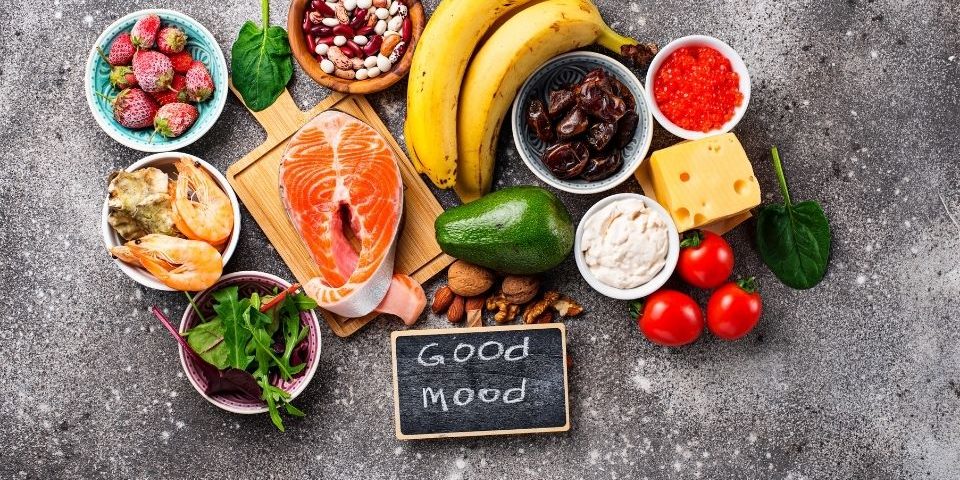| The link between physical health and what you eat is well understood, but did you know that what you eat has a huge impact on your mood and how you feel? In my blog post below, I am sharing with you what foods can help raise your mood, reduce anxiety and help you get motivated. |
I wonder how we forgot about this connection because it was common knowledge in times gone by. Way back when (think medieval times), people would eat quince, dates and elderflowers, if they were feeling a little blue, and use lettuce and chicory as nature’s tranquilisers.
Modern science has extensively studied the impact of food on mood, and we now understand why food has such a positive (or negative) effect and also which foods we should be eating more (or less) of to support mental health.
Managing anxiety, stress, depression and other mood disorders is complex, and there’s no one-size-fits-all solution but you will find below a quick guide to help you take the first steps in supporting your mood through diet and lifestyle changes.
GOOD NUTRITION MAKES ALL THE DIFFERENCE
The very edited highlight of the research into what you should eat to balance your energy and improve your mood is to follow a Mediterranean-style diet featuring plenty of whole, natural foods. That also means learning to balance your blood sugar levels. Loss of blood sugar balance has a clear link to stress, anxiety and depression. 50% of low mood is down to blood sugar imbalances.
Learning how to become a master of your blood sugar balance is the secret to having more energy, a better mood and controlling your weight.
In the same way that eating well can positively influence mood, making poor food choices can have the opposite effect.
MOOD AND SLEEP HAVE A LOT IN COMMON
Lack of sleep has a big effect on how you feel, and finding out how to sleep through the night and wake up refreshed, could be the missing piece in getting you to feel a whole lot better.
The amino acid tryptophan is not only the raw material for serotonin but also for melatonin, a brain chemical that helps you sleep by controlling the sleep/wake cycle. It’s the brain’s neurotransmitter, which keeps you in sync with the earth’s day/night cycle. As you start to wind down in the evening, serotonin levels rise and cortisol levels fall. As it gets darker melatonin kicks in.
What can you do to improve your quantity and quality of sleep?
Provide more of the building blocks that make serotonin – tryptophan, an amino acid present in most protein-rich foods like chicken, cheese, tuna, tofu, eggs, nuts, seeds and milk. The conversion from tryptophan to serotonin requires folic acid, B6, vitamin C and zinc. These can be found in beef, broccoli, cashews, chicken, chickpeas, cauliflower, peppers, kale, kiwi, lamb, oranges, parsley, pumpkin seeds, pineapple, salmon, spinach, turkey and tuna.
EXERCISE TO BEAT THE BLUES
If you are feeling down and de-motivated, it’s not easy to get started on exercise: but the benefits are worth it.
Exercise increases blood flow to the brain and raises levels of the brain chemicals serotonin and dopamine. Higher serotonin levels make us feel good. Dopamine helps create a sense of motivation. Natural light also stimulates serotonin. Exercise helps you to sleep because it can “burn off ” excess adrenalin. It helps to balance blood sugar which, in turn, improves your mood and motivation.
When you get started, aim for 20-30 minutes of exercise five days a week, preferably outdoors (depending on the weather obviously!). Brisk walking is great and totally counts as exercise! It is important that you find something that you like and enjoy doing rather than just for the sake of ticking it off your list.
DON’T FORGET VITAMIN D!
The link between mood disorders and low vitamin D levels is now well established. You may want to consider topping up your vitamin D by eating foods rich in vitamin D such as oily fish (salmon, sardines, fresh tuna, trout, halibut, mackerel), high-quality cod liver oil, egg yolks and liver. Get your vitamin D levels checked as if yours is low as food alone is not going to cut it. You may have to get yourself a nutritional supplement of vitamin D3.
ASK FOR HELP
We know that the right diet and lifestyle plan combined with motivational coaching to help you every step of the way can be an enormous help. But, if you have tried to make changes on your own in the past, you’ll understand that having the knowledge is only a very small piece of the puzzle. Book your complimentary health transformation call with me for your opportunity to discuss your health concerns and goals with me and get clarity on where to start!


